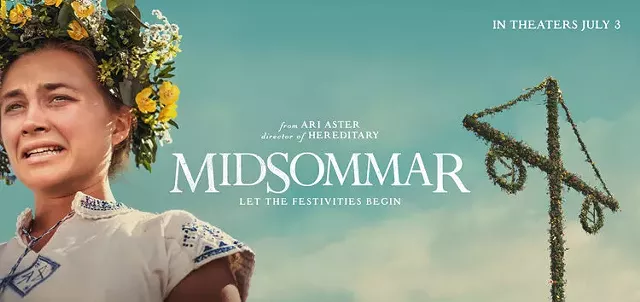click to enlarge

Following his startling big-screen bow last year with Hereditary, filmmaker Ari Aster returns to the horror genre with Midsommar, which details a fateful trip to Sweden by a group of American tourists.
As he displayed in Hereditary, whose success placed Aster firmly on the map alongside Jordan Peele and, to a lesser extent, M. Night Shymalan, as current masters of the genre, Aster is a commanding talent. Midsommar is exceedingly well-made and quite distinctive. There’s a good cast on hand, but this is a clear case of the director as the star.
But it’s also too long. The film is never dull, but at 147 minutes, it’s overstated. Consider that Midsommar is longer than such established horror classics as 1968’s Rosemary’s Baby (136 minutes), 1973’s The Exorcist (121 minutes), and 1980’s The Shining (144 minutes), yet it doesn’t need to be. Its point has been made, and its tale told well before the end credits roll.
The byproduct of this directorial indulgence is that by the third act, the audience is way ahead of the game. It’s clear that the characters – those still standing, that is – are in way over their heads, and have little hope of escape. This also allows the audience ample time to ponder little lapses in logic, which can be fatal for a film like this.
At the center of the narrative is Florence Pugh’s Dani Ardor, a quintessentially tragic heroine who has just suffered a grievous family loss. Her long-standing emotional neediness has become grating to her boyfriend Christian (Jack Reynor), whose exasperation is a dead giveaway (no pun intended) that their four-year relationship is coming to an end.
On a whim, she decides to accompany Christian and his grad-school buddies Mark (Will Poulter) and Josh (William Jackson Harper) on an anthropological research trip to Sweden to study the practices and rituals of a pagan cult, of which their friend Pelle (newcomer Vilhelm Blomgren) is a member.
The remote rural landscape has been beautifully captured by cinematographer Pawel Pogorzelski (a Hereditary holdover), and the pounding score (by The Haxan Cloak, nee Bobby Krilc) adds further shading to the mounting suspense. Technically, Midsommar is an unqualified success. It’s also not for the faint of heart, as Aster is not one to pull any punches.
Pugh gives a gutsy, even heart-rending performance as Dani, but by the end, she’s almost a background figure. Her character has traveled its arc, and it’s simply a matter of waiting for the inevitable final twist, which is not entirely surprising, to bring the narrative full circle.
If Hereditary echoed The Brotherhood of Satan (1971), a terrific but obscure gem of the genre, Midsommar bears certain (and move overt) thematic similarities to another genre classic, The Wicker Man (1973). It may not supplant that film’s status, but whatever its faults, Midsommar is certainly far superior to the unnecessary 2006 remake of The Wicker Man.
See Mark Burger’s reviews of current movies on Burgervideo.com. © 2019, Mark Burger.




